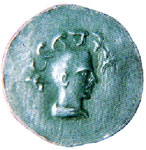Kuttuvan Kotai
| Kuttuvan Kotai | |
|---|---|
 Kuttuvan Kotai. Legend in Tamil-Brahmi: "Ku-t-tu-va-n Ko-tai" | |
| House | Chera dynasty |
Kuttuvan Kotai (Tamil: குட்டுவன் கோதை), also spelled Kothai/Kodai,[1] was a Chera ruler of early historic (pre-Pallava) south India.[2][3]
Silver coins bearing a portrait facing right with Tamil-Brahmi legend "Ku-t-tu-va-n Ko-tai" have been discovered from Amaravati riverbed in Karur, central Tamil Nadu.[2][4] The reverse of the coins are blank. The coin seems to be an imitation of the Roman portrait head coins.[4] Whether these coins were used as a currency in trade transactions is not clear.[3]
Scholars identify Kotai with "Cheraman Kuttuvan Kotai" mentioned in the early Tamil text Purananuru, 54.[4] This Chera is mentioned as Kotai, not as Kuttuvan Kotai, in the body of the poem, but the appended colophon gives the full name "Kuttuvan Kotai".[4][1] The Chera is eulogised in the Puram by Konattu Ericchalur Matalur Maturai-kumarananar.[1]
Kuttuvan was probably an ancient title for the Chera rulers of south India. Early Tamil texts refer to "Kuttuvar" as a kingship group and "Kuttanatu" as the country of the Kuttuva people.[5] The term Kuttanatu is indicated in the entry in Periplus Maris Erythraei, referring to "Cottonora", ‘where the pepper grows’.[5] The estuarine region Kottayam and Alappuzha districts of Kerala is now known as Kuttanatu.[5]
References
[edit]- ^ a b c K.G. Sesha Aiyar, Chera Kings of the Sangam Period, London, 1937. 53-54.
- ^ a b Champakalakshmi, R. Trade, Ideology, and Urbanization. Delhi: Oxford University Press, 1996. 111 and 137.
- ^ a b Rajan, K. "Emergence of Early Historic Trade in Peninsular India." Early Interactions Between South and Southeast Asia, edited by Pierre-Yves Manguin, A. Mani and Geoff Wade, Institute of Southeast Asian Studies (ISEAS), 2011. 182-83.
- ^ a b c d Majumdar, S. B. "Money Matters: Indigenous and Foreign Coins in the Malabar Coast." Imperial Rome, Indian Ocean Regions and Muziris: New Perspectives on Maritime Trade, edited by K. S. Mathew, Routledge, 2016. 410-11.
- ^ a b c Ganesh, K. N. (2009). Historical Geography of Natu in South India with Special Reference to Kerala. Indian Historical Review, 36(1), 3–21.


 French
French Deutsch
Deutsch